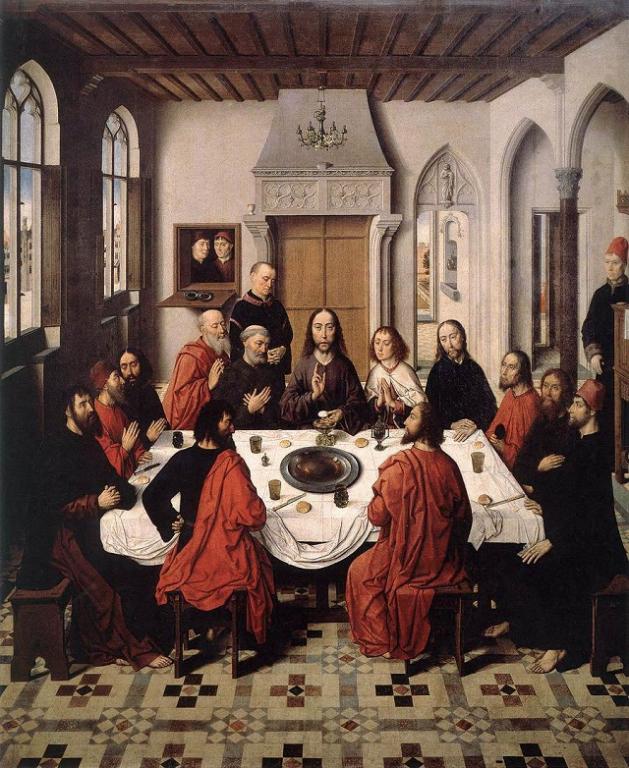
Today we hear the argument that “men and women are equal in Christ, so why can’t a woman be a priest? Jesus certainly didn’t discriminate in this way!”
The Church’s all-male priesthood doesn’t signify in the first place that women are inferior to men (Gal. 3:28: “There is neither Jew nor Greek, there is neither slave nor free, there is neither male nor female; for you are all one in Christ Jesus.”), only that they have different roles to play within the Body of Christ.
One reason for the male-only priesthood is very straightforward: Jesus Christ was a man. During Mass a priest stands in place for Christ (since it is, properly speaking, Christ Himself, not the priest, who offers the Sacrifice and performs the supernatural consecration), thus it is fitting that men only are ordained. Accordingly, none of the twelve disciples chosen by Jesus to be the first priests were women. And Scripture presupposes that only men were to be ordained and to serve as priests or elders or bishops (1 Cor. 9:5: “accompanied by a wife, as the other apostles”; 1 Tim. 2:12; 3:2, 12: “husband of one wife”).
Neither Jesus nor the Church, in following Jesus, can rightly be accused of “sexism.” Indeed, the very highest, most exalted and sublime of God’s created beings – Jesus’ own mother, the Blessed Virgin Mary – is a woman; no man ever had the immense, unfathomable honor of “bearing God.” It was a woman who had the privilege first to see the risen Jesus (Mary Magdalene: John 20:11-18), and of course Jesus showed extraordinary regard for women throughout His public Ministry.
By the same token, the Catholic Church reveres women in its official documents and teachings, and offers as role models many strong, brilliant women saints and biblical heroines from throughout the Church and salvation history. No Church can be sexist that exalts such women as St. Catherine of Siena, St. Teresa of Avila, St. Therese of Lisieux, St. Edith Stein, St. Hildegard of Bingen, and St. Teresa of Calcutta (Mother Teresa).
Perhaps “unisexists” object also to the fact that God chose to become incarnate in a male body? Maybe God should have come as a sexless eunuch or a woman? On what basis can mere fallen human beings (of either sex) question the will and wisdom of Almighty God? Many of this mindset justify their views by questioning of Holy Scripture (either its content, or its faithful manuscript transmission).
But very few scholars would deny that Jesus was a man. The Catholic Church can’t call to the priesthood a woman who wasn’t given a certain gift and vocation — by virtue of God’s will – any more than it could call a man to bear a child and suckle it after birth.
Critics reply that patriarchal society, not God, has created these artificial, unnatural, unjust barriers between the sexes, and that the different “roles” we speak of aren’t found in Scripture; rather they were imposed by a patriarchal Church operating in a patriarchal society.
To the contrary, gender roles come from Jesus Himself, before anyone can theorize about whether men tried to dominate and subvert the Church for unsavory chauvinistic ends. In other words, it is a “pre-historical” consideration (i.e., pre-Church history) going back to the roots of Christianity. Jesus didn’t specifically say, “Do not ordain women,” yet He did not include women among His disciples, whom Catholics believe were the model for the priesthood.
He gave no indication of being “anti-woman,” and wasn’t shy to overturn conventions. Indeed, His whole life can be seen as a revolutionary subversion of the social order. Thus, if it were His will that women should be priests, certainly that would have been made clear, and some of the disciples would have been women.
Also, if it were God’s will to have women priests, then it surely would have happened, because Catholics believe in faith that the Holy Spirit guides the Church. God can overcome any obstacle, including men that wanted to “keep women down” or exclude them for improper reasons. But if someone believes that God is unable to work His purposes despite a “patriarchal culture,” then the problem lies in lack of faith in God, or in falsely accusing God Himself.
The existence of roles of greater and lesser authority do not mean that those with one role are greater or lesser than others. If women are supposedly unequal to men in the Catholic Church (and Christianity, generally), then Jesus is also not equal to the Father, since He subjected Himself to the Father (Phil. 2:5-8; cf. 1 Cor. 11:3; 15:28) and even to Mary and Joseph (Lk. 2:51). The Holy Trinity itself provides an edifying analogy, showing us a clear example of an equality that nevertheless includes (by its very nature) subjection and differential roles.
***
Related Reading:
***
(originally posted in 2007; slight modifications on 4-5-16)
Photo credit: The Last Supper (1464-1467), by Dieric Bouts (c. 1420-1475) [public domain / Wikimedia Commons]
***












